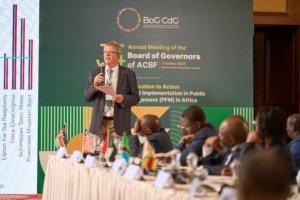The 34th Board of Governors meeting of the African Capacity Building Foundation in Addis Ababa on Tuesday featured an engaging knowledge sharing session on health financing that drew strong interest from participants.
The discussion focused on how countries can use health taxes to improve population health while creating more reliable sources of domestic revenue.
Professor Corné van Walbeek from the University of Cape Town shared evidence that raising cigarette prices by just 10% can lead to a drop in smoking rates by 4% to 8%. Fewer people smoking means fewer cases of tobacco-related illness and more tax revenue for governments to invest in public services.

The findings reinforced how fiscal tools can improve health outcomes while expanding domestic revenue streams.
The session also highlighted examples from across Africa. In Cabo Verde, tobacco tax reforms raised government revenue and reduced smoking rates.
In South Africa, a sugar tax prompted manufacturers to cut sugar content in beverages.
These examples showed that well-designed excise taxes can influence markets, generate predictable income, and lower future health costs.
Innovative Health Taxes
The discussion linked directly to outcomes from the Eighth Ordinary Session of the African Union Specialized Technical Committee on Finance, Monetary Affairs, Economic Planning and Integration, held from October 2 to 3 in Johannesburg.
In their ministerial declaration, African finance and health ministers agreed to introduce innovative health taxes on harmful products, raise health spending toward the Abuja target of 15 percent of national budgets, and strengthen public financial management.
The declaration also called for stronger domestic resource mobilization, improved public financial management and increased investment in primary health care through mechanisms such as the AUDA-NEPAD Programme for Investment and Financing in Africa’s Health.
This direction aligns with the evidence presented in Addis Ababa, which showed that health taxes create a “triple win” of improved public health, increased fiscal space, and reduced long-term healthcare costs.
Dr. William Maina of the World Health Organization noted that noncommunicable diseases now account for more than 30 percent of deaths in the African region and could reach 50 percent by 2030.

Maina warned that the growing cost of treating these diseases is placing major strain on health systems and household finances across the region.
The WHO estimates that the productivity cost of NCDs already exceeds one-third of the total cost of illness in Africa.
These concerns reflect a wider global agenda. The 2015 United Nations Addis Ababa Action Agenda on Financing for Development recognized tobacco taxation as an effective tool for mobilizing domestic resources while advancing sustainable development.
A Sustainable Path Forward
Support for health taxes marks a shift in how governments view fiscal and health policy.
According to experts, fiscal and health policy are no longer separate discussions. Linking public health goals with fiscal strategy allows countries to prevent disease, stabilize budgets and build more resilient health systems.
African governments are beginning to treat public health and fiscal planning as part of the same agenda.
Taxes on tobacco, alcohol and sugary drinks offer a way to address both immediate and future challenges.
They influence consumer choices while building the foundation for more sustainable health systems.
The dialogue in Addis Ababa and the commitments in Johannesburg showed that Africa’s approach to sustainable development is evolving.































